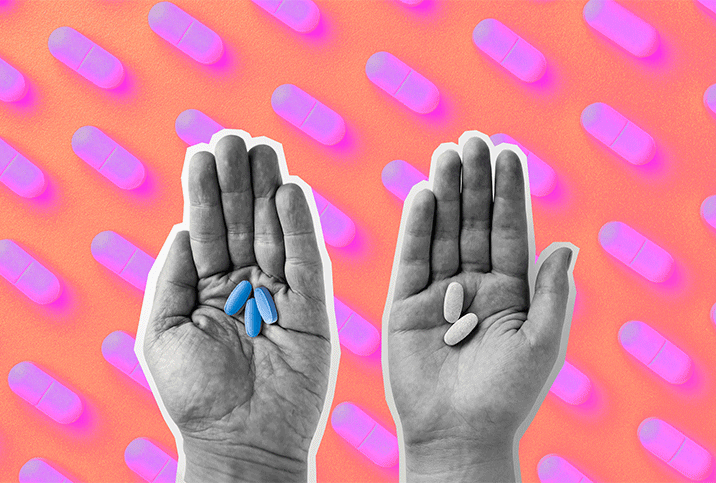Why HRT Isn't Recommended for Women Over 60

The average age when menopause starts in the United States is 51, and the definition of menopause is when periods have stopped for a year. The menopausal transition is the lead-up to menopause and lasts an average of four years. This transition is when the ovaries start producing fewer hormones, and symptoms such as hot flashes, sleep disturbances, mood changes, vaginal dryness and painful sex begin.
There's no one-size-fits-all treatment, but many women decide to take some sort of hormone therapy to help ease these symptoms.
Formerly called hormone replacement therapy (HRT) and now more commonly known as menopausal hormone therapy (MHT), systemic hormones have several benefits. In addition to relieving symptoms, they can benefit the brain, bones and heart, depending on your age and how far out you are from menopause.
According to Tara Scott, M.D., medical director of Forum Health Akron in Ohio, the Food and Drug Administration has approved MHT for treating these three conditions:
- Preventing osteoporosis
- Combating menopausal symptoms, such as hot flashes
- Relieving genitourinary syndrome of menopause (GSM), which includes vaginal and bladder symptoms such as frequent urinary tract infections (UTIs), painful intercourse and vaginal dryness
Why timing matters when starting HRT
MHT is not recommended if you're older than 60, or more than 10 years past your last period, Scott explained.
The typical recommendation is for women to start MHT within a few years of menopause and not to wait. HRT can boost cardiovascular health within this window, but starting treatment after age 60 can increase your chances of stroke and heart attack.
Starting MHT later in life when you already have some buildup of plaque in your coronary (heart) arteries can cause these heart issues when estrogen is given because it can make the plaque unstable, Scott said. This is what can cause a cardiac event.
The hormone delivery method makes a difference
"For any given woman between the ages of 50 and 60, the benefits outweigh the risk of hormone therapy," Scott said, unless the patient has a history of breast cancer or blood clots, and even then, it's not black and white.
The Women's Health Initiative, a study conducted 20 years ago, showed an increased risk of breast cancer and blood clots when using hormone therapy, Scott said. However, the study focused specifically on oral synthetic estrogen and synthetic progesterone, which are not chemically similar to the hormones in the body and represent only one delivery method for treatment.
You can take hormones for menopause in two ways: systemically and locally. Systemic hormones circulate throughout your body in the bloodstream. Local hormones stay confined in the vagina and don't circulate in your blood.
Scott explained that when you take estrogen in pill form, it travels through the gut into the liver, where the clotting proteins are located, which means there's a higher chance of blood clots with oral, or systemic, estrogen. But if you take estrogen through a patch, it's absorbed into the skin and blood vessels and bypasses the liver.
"Studies have shown there isn't an increased risk of blood clots when you take it through the skin," Scott said. In other words, how you take hormones matters.
Despite the limitations of the Women's Health Initiative and a better understanding today of MHT benefits and risks, many healthcare providers still aren't comfortable prescribing hormone therapy for their patients because of this study.
Treatment options for women over 60
Even though it's not recommended to start HRT after age 60, vaginal estrogen can be started at any point for symptoms such as vaginal dryness. Vaginal estrogen comes in creams, a ring, tablets and suppositories at various doses.
Some symptoms, such as hot flashes, ease after menopause, whereas others, such as vaginal dryness, may get worse. Transitioning from MHT to a topical estrogen to treat vaginal dryness and relieve pain from sex may be an option.
"If someone comes in with hot flashes at 60, it's not usually because of estrogen, it's because of cortisol or sugar levels going up and down. I look for the cause," Scott explained.
Another medication Scott likes for its effectiveness in relieving vaginal dryness is Intrarosa, which became FDA-approved in 2016. It contains dehydroepiandrosterone (DHEA), a hormone naturally made by the body.
"The physiology of it is it's not going to raise estrogen levels if you're just looking for something local," Scott explained.
She said Intrarosa helps clients with vaginal issues favorably compared with vaginal estrogen. But Intrarosa usually requires preauthorization and it's expensive and not always covered by insurance.
All women, regardless of their symptoms and hormone therapy preferences, should make sure they feel comfortable with their provider and their care plan. If you're not satisfied with your treatment or told you can't take hormones, Scott suggested asking your provider these questions:
- Do you check hormones?
- What's your experience prescribing hormones?
- Do you feel like you have training in how to manage hormone therapy? If not, who would you refer me to?
You can also search for a knowledgeable provider in the North American Menopause Society directory. Regardless, HRT and menopause treatment can be complex and need to be personalized for you.


















